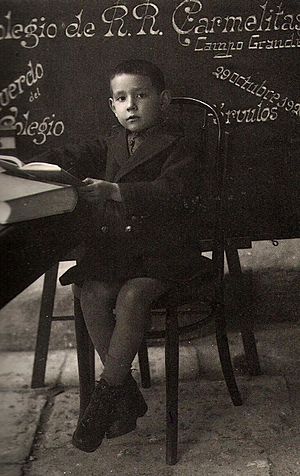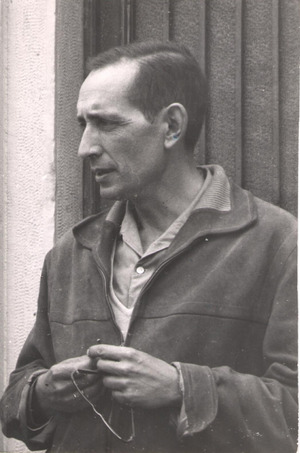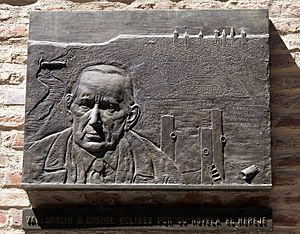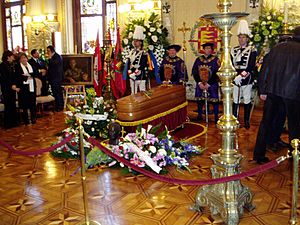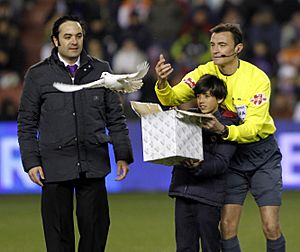Miguel Delibes facts for kids
Quick facts for kids
Excelentísimo Señor Don
Miguel Delibes
MML
|
|
|---|---|
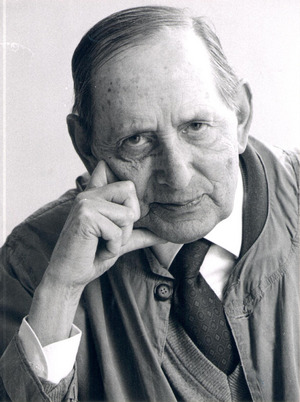
Delibes in 1998
|
|
| Born | Miguel Delibes Setién 17 October 1920 Valladolid, Spain |
| Died | 12 March 2010 (aged 89) Valladolid, Spain |
| Resting place | Cementerio del Carmen, Valladolid |
| Occupation | Novelist, journalist, newspaper editor |
| Language | Spanish |
| Nationality | Spanish |
| Genre | Narrative fiction, Essays |
| Literary movement | Post-civil war literature |
| Notable works | El camino |
| Spouse | Ángeles de Castro (m. 1946, d. 1974) |
| Children | Miguel, Ángeles, Germán, Elisa, Juan, Adolfo & Camino. |
| Signature | |
 |
|
| Seat e of the Real Academia Española | |
| In office 25 May 1975 – 12 March 2010 |
|
| Preceded by | Julio Guillén Tato |
| Succeeded by | Juan Gil Fernández |
Miguel Delibes Setién (born October 17, 1920 – died March 12, 2010) was a famous Spanish writer, journalist, and newspaper editor. He was part of a group of writers known as the Generation of '36, who wrote after the Spanish Civil War. From 1975 until he passed away, he was a member of the Royal Spanish Academy, which is a very important group that helps keep the Spanish language correct.
Miguel Delibes studied business, but he started his career drawing cartoons and writing newspaper columns. Later, he became the editor of a regional newspaper called El Norte de Castilla. Eventually, he decided to focus only on writing novels.
He loved nature, especially the plants and animals of Castile, a region in Spain. He was also very passionate about hunting and spending time in the countryside. These interests often appeared in his books. He frequently wrote from the point of view of someone who lived in the city but still felt a strong connection to the natural world.
Delibes was one of the most important writers in Spain after the Spanish Civil War. He won many literary awards for his work. Some of his books were even turned into plays or movies, and these adaptations also won awards, including at the famous Cannes Film Festival. He was seen as one of the top Catholic writers of the second half of the 20th century, alongside authors like Heinrich Böll and Graham Greene. He was very sad after his wife died in 1974. In 1998, he was diagnosed with cancer, and he never fully recovered. He died in 2010.
Contents
Biography
Early Life and Education
Miguel Delibes was born in Valladolid, Spain, on October 17, 1920. He was the third of eight children. His father was a law professor. Miguel spent many summers in the town of Molledo, where his father was born. In 2009, Valladolid named Miguel an "adopted son" of the city.
His family name, Delibes, came from France. Miguel's grandfather was the brother of a French composer named Léo Delibes. His grandfather moved to Spain to help build a railway.
Miguel went to school in Valladolid. When the Spanish Civil War started, he joined the Navy on the Nationalist side. He served on a ship called the Canarias. After the war ended in 1939, he returned home. He studied business and law. He also went to an art school in Valladolid to improve his drawing skills. In 1941, he got a job as a cartoonist for a newspaper in Valladolid called El Norte de Castilla.
On April 23, 1946, he married Ángeles de Castro. She became a great source of inspiration for his writing. They spent their honeymoon in Molledo.
Beginning His Writing Career
After he got married, Miguel Delibes's writing career really took off. In 1947, he started writing his first novel, La sombra del ciprés es alargada (The Cypress Casts a Long Shadow). The next year, this book won the Premio Nadal, a major Spanish literary prize. This award showed everyone that he was a new and important writer in Spain.
During this time, his family also grew. His son Miguel, who later became a famous biologist, was born in 1947. His daughter Ángeles, who also became a well-known biologist, was born in 1948. His third child, Germán, was born in 1949.
In 1950, Delibes started a new phase in his writing. After getting sick with tuberculosis, he published his third novel, El camino (The Road). This book is about a boy's journey of discovery as he moves from the countryside to the city. This novel made him even more famous in Spanish literature after the war. That same year, his daughter Elisa was born. She later studied Spanish and French.
In 1952, he became the assistant director of El Norte de Castilla newspaper. He often had disagreements with the government's censorship rules, which tried to control what could be published. During this time, he published a new book almost every year. These included Mi idolatrado hijo Sisí (My Adored Son Sissi) in 1953, and Diario de un cazador (Diary of a Hunter) in 1955, which won the National Prize for Fiction. In 1956, his son Juan was born. Like his father, Juan loved hunting and fishing. In 1958, Miguel Delibes became the director of El Norte de Castilla.
His 1959 novel, La hoja roja (The Red Leaf), was about a photographer who thinks back on his life as he gets ready to retire.
Peak of His Literary Career
The 1960s were a very successful time for Delibes's writing. His sixth son, Adolfo, was born during this period. In 1962, Delibes published Las ratas (The Rats), which is considered one of his best works. This story uses his own memories to describe life in a small Castilian village that no longer exists. The book won the Critics Award. In the same year, his last child, Camino, was born. She later studied Philosophy and Letters. Also in 1962, a movie version of El camino was made.
In 1963, Delibes resigned as director of El Norte de Castilla because he disagreed with the Minister of Information and Tourism about freedom of the press. In 1964, he spent six months in the United States as a visiting professor. After returning, he wrote and published Cinco horas con Mario (Five Hours with Mario). Many people consider this his greatest work. The novel is a long speech given by a woman who is sitting by her late husband's side, remembering their life together.
On February 1, 1973, Miguel Delibes was chosen to join the Royal Spanish Academy. His wife, Ángeles de Castro, died on November 22, 1974, at the age of 50. Her death deeply affected him for the rest of his life.
On May 25, 1975, he gave his first speech to the Royal Spanish Academy. His speech was about "The meaning of progress from my work," and he later turned it into a book called Un mundo que agoniza (A World That Is Dying). That same year, he published his twelfth novel, Las guerras de nuestros antepasados (The Wars of Our Ancestors). In the following years, he published several books about hunting, which he loved, and his only book about fishing, Mis amigas las truchas (My Friends the Trout).
In 1979, a play based on Five Hours with Mario opened in Spain and was very successful.
1980s and 1990s: Awards and Recognition
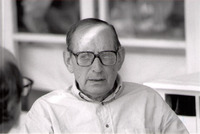
In 1981, Delibes published Los santos inocentes (The Holy Innocents). This book showed the difficult lives of a poor rural family in Spain. In 1982, he received the Prince of Asturias Award for Literature, one of Spain's most important awards.
In 1983, the University of Valladolid gave him an honorary doctorate degree. The next year, he won the Castile and León Prize for Literature. Also in 1984, The Holy Innocents was made into a film. The actors in the movie, Alfredo Landa and Francisco Rabal, won acting awards at the Cannes Film Festival for their roles. In 1985, he was honored by the French Republic.
He continued to receive many honors. In 1987, his book Madera de héroe (The Stuff of Heroes), which was about heroism during the Spanish Civil War, won the City of Barcelona Prize.
In 1991, the Spanish Ministry of Culture gave him the National Prize for Spanish Literature. That year, he also published Señora de rojo sobre fondo gris (Lady in Red on a Grey Background), which was a clear tribute to his late wife. In 1993, he won the prestigious Premio Miguel de Cervantes, the highest award for Spanish-language literature.
Later Years and Final Works
His last major novel, El hereje (The Heretic), was published in 1998. It was a tribute to his hometown of Valladolid and won the National Fiction Prize. When he received this award, Delibes, who was 79, said he was "hanging up his writing tackle," meaning he would stop writing.
After The Heretic, he wrote very little. This was mainly because of the colon cancer he had been battling. He became less active and felt a growing lack of interest in things. His last book, La Tierra Herida (The Wounded Earth), published in 2005, was a conversation between him and his eldest son, Miguel Delibes, who was a biologist. The book was a powerful discussion about climate change.
In 2007, he received the Quijote Prize for Spanish Literature. Because he was not well, the King and Queen of Spain, Juan Carlos I and Sofia of Greece, visited him at his home in Valladolid. His city honored him by creating a "Route of the Heretic" based on his novel and building the Centro Cultural Miguel Delibes, which is a music school, auditorium, and convention center.
In November 2009, he received the Gold Medal of Castile and León for "his defense of Castilian," the Spanish language spoken in that region. Many groups in Spain and other countries suggested him multiple times as a candidate for the Nobel Prize in Literature.
Politics
Even though Delibes fought with the Nationalists during the Spanish Civil War, he was very upset by the harsh actions of the government. He turned against Francisco Franco, the leader of Spain at the time, and worked to help bring democracy back to Spain. In 1963, he had to resign from his job as director of El Norte de Castilla because he refused to follow official orders that limited freedom of the press.
Delibes was described as a "liberal Catholic." This means he believed in finding a middle ground between traditional Catholic views and more modern ideas.
Death
In early March 2010, Miguel Delibes's health got worse. On March 11, he was in critical condition. He passed away at his home in Valladolid on the morning of March 12, 2010, at the age of 89. His death was caused by the colon cancer he had been fighting since 1998.
His funeral chapel was set up in the Town Hall of Valladolid. Many famous people and over 18,000 people came to pay their respects. His funeral was held the next day in the Cathedral of Valladolid. His remains were cremated and buried in the Pantheon of Illustrious Men of Valladolid, alongside other important figures. The city of Valladolid allowed his wife's remains to be moved to the same cemetery, fulfilling his wish to be buried with her.
Works
- La sombra del ciprés es alargada (1947). Won the Premio Nadal.
- El camino (1950).
- Mi idolatrado hijo Sisí (1953).
- Diario de un cazador (1955). Won the National Prize for Literature.
- Siestas con viento sur (1957). Won the Fastenrath Award.
- La hoja roja (1959).
- Las ratas (1962). Won the Premio de la Crítica (Critics' Award).
- Cinco horas con Mario (1966).
- El príncipe destronado (1973).
- Las guerras de nuestros antepasados (1975).
- El disputado voto del señor Cayo (1978).
- Los santos inocentes (1982).
- El tesoro (1985).
- Madera de héroe (1987).
- Señora de rojo sobre fondo gris (1991).
- El hereje (1998). Won the National Prize for Literature.
- La tierra herida: ¿qué mundo heredarán nuestros hijos? (2005). Written with his son, Miguel Delibes de Castro.
Movie and TV Adaptations
Many of Miguel Delibes's novels have been turned into movies or TV shows:
- El camino was made into a TV series in 1978 and a movie in 1964.
- Mi idolatrado hijo Sisí became the movie Retrato de Familia (1976).
- El príncipe destronado was adapted as La guerra de papá (1977).
- The Holy Innocents (1984) was a very famous film that won awards at the Cannes Film Festival.
- The Disputed Vote of Mr. Cayo (1986).
- El tesoro (1988).
- La sombra del ciprés es alargada (1990).
- Las ratas (1996).
- Diario de un jubilado was adapted as Una pareja perfecta (1998).
Awards and Honors
Miguel Delibes received many important awards and honors throughout his life:
- Premio Nadal (1947)
- Premio Nacional de Narrativa (National Prize for Fiction) (1955 and 1999)
- Premio Fastenrath from the Royal Spanish Academy (1957)
- Prince of Asturias Award for Literature (1982)
- Premio de las Letras de Castilla y León (1984)
- Premio Ciudad de Barcelona (1987)
- Premio Nacional de las Letras Españolas (National Prize for Spanish Literature) (1991)
- Premio Miguel de Cervantes (1993) – This is the most important award for Spanish-language writers.
- Premio Luka Brajnovic for Communication (1997)
He also received several honorary doctorate degrees from universities in Spain and Germany. He was named a "favorite son" of Valladolid and an "adopted son" of Molledo. He also received gold medals from the Province of Valladolid and the Government of Cantabria.
See also
 In Spanish: Miguel Delibes para niños
In Spanish: Miguel Delibes para niños
 | Claudette Colvin |
 | Myrlie Evers-Williams |
 | Alberta Odell Jones |


